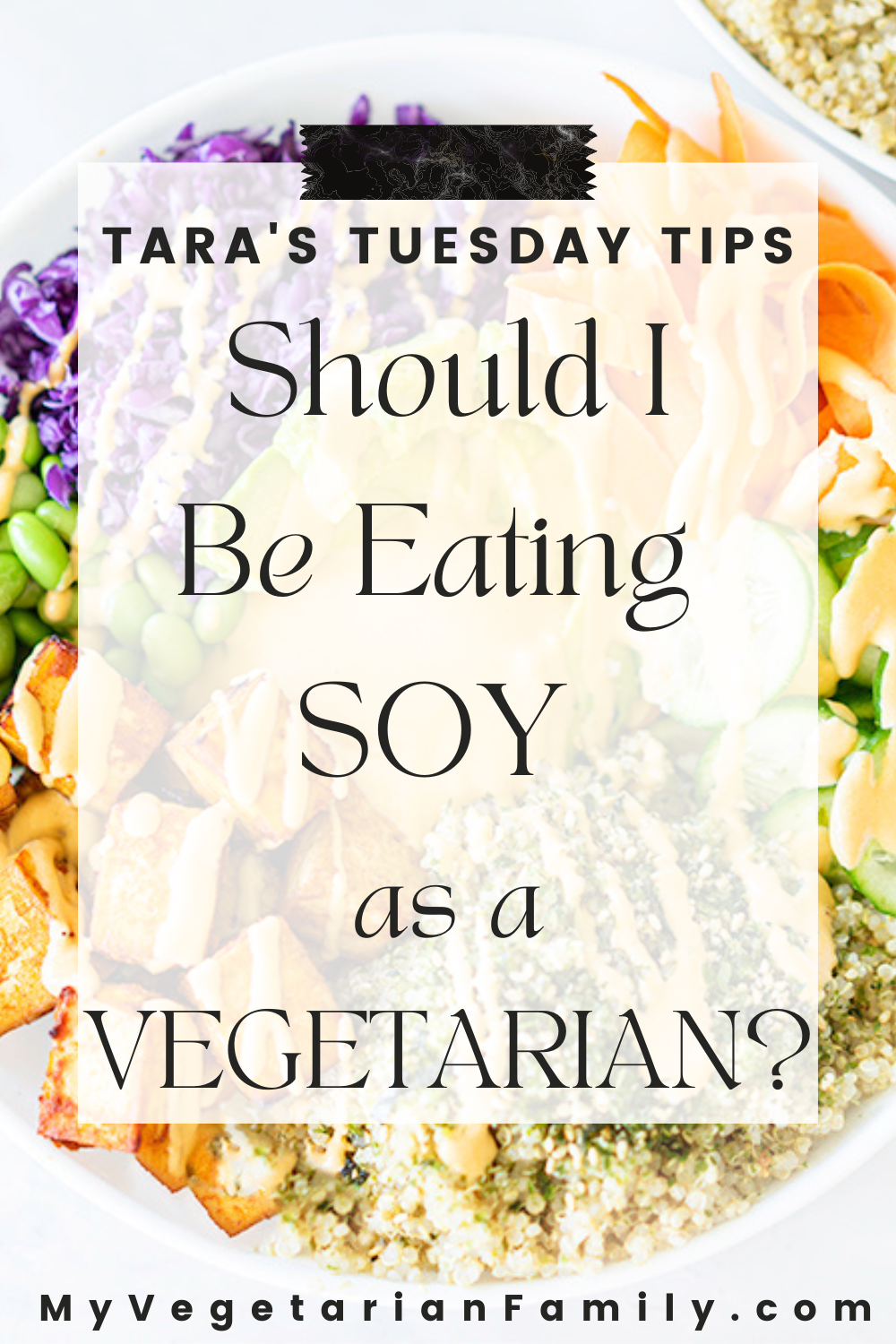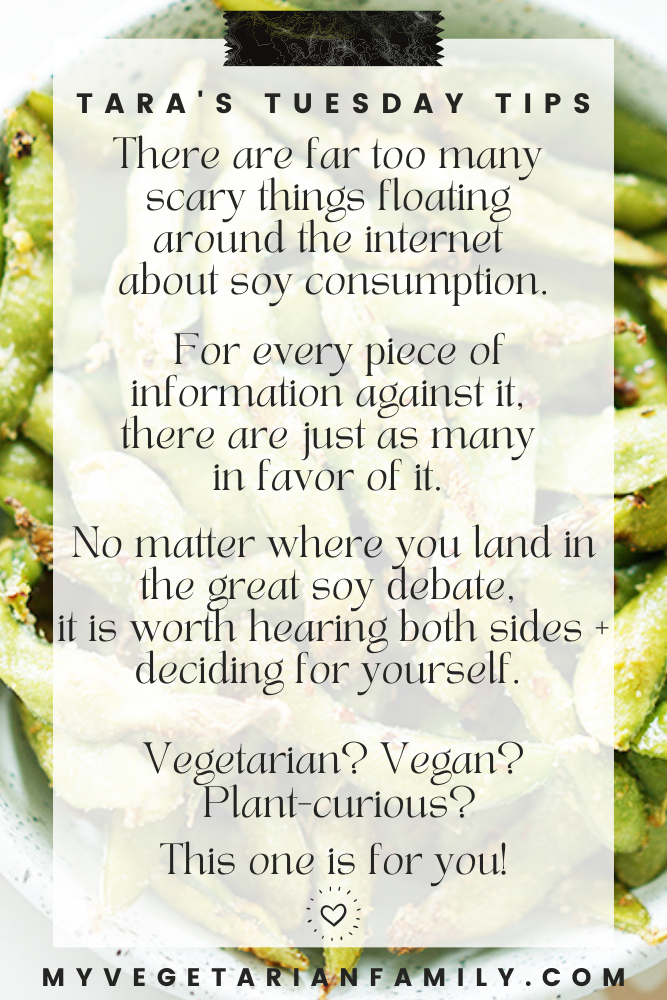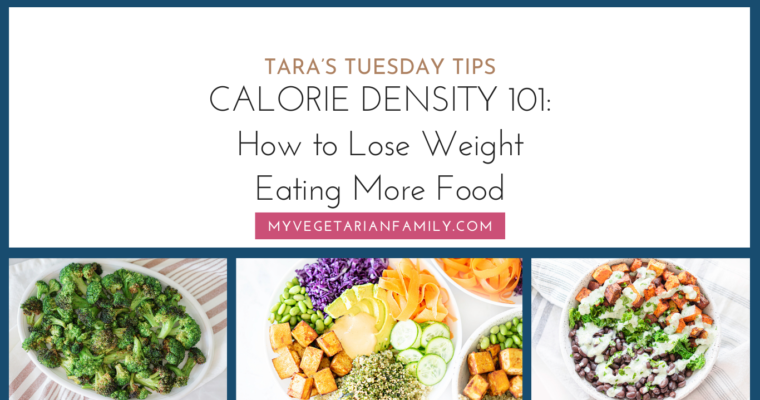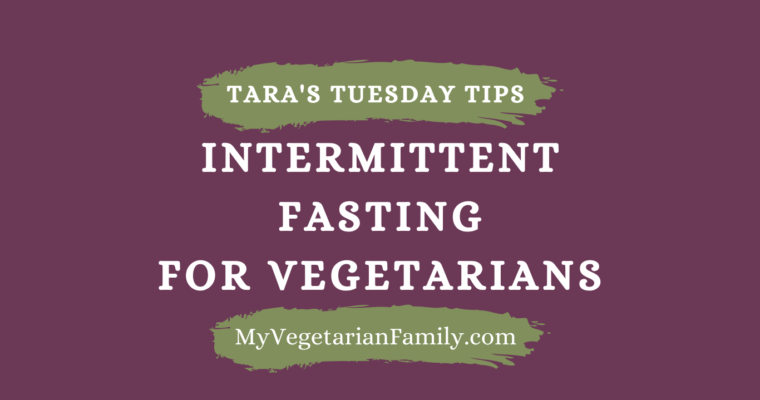There are far too many scary things floating around the internet about soy consumption. Everything from man boobs to excessive hair growth, cancer + infertility. For every piece of information you find against soy consumption, there are those that sing the praises of eating soy. No matter where you land in the great soy debate, it is worth hearing both sides + deciding for yourself. If you have ever asked yourself, “Should I be eating soy as a vegetarian?”, then this one is for you!
Tara’s Tuesday Tips:
Should I Be Eating Soy as a Vegetarian?
Soy has been widely studied + written about in publications ranging from peer-reviewed medical journals to everyday grocery store magazines. With so much conflicting data floating around the news + social media, I thought this Tuesday we should take a closer look + see if we should be including soy in our diets as vegetarians. As one of the most controversial nutrition topics out there today, I’m going to give you a few tips so that you can make an informed choice for yourself.
What is Soy?
Soybeans! A legume of Asian origin that grows in green, yellow, or black. From soybeans we get edamame, tempeh, soy milk, tofu, protein supplements, miso, soy powders, nuts, and oils. Soy contains all 9 amino acids and is therefore considered a complete protein. With lots of protein, fiber, B vitamins, isoflavones, potassium, and magnesium, plant-based eaters rely on soy products quite a bit as a protein source, and a meat and/or dairy replacement. The variety of soy products available today range from minimally processed soybeans to highly processed faux meats, powders + oils.
What is Soy Protein Isolate?
To make soy protein isolate, soybeans are soaked + dehydrated isolating out the protein. This isolated protein is then added to foods boosting the nutrition content without adding fat + calories. This is similar to the process in which whey protein is isolated out of dairy. Eating foods containing soy protein isolate can help you get a large dose of protein in one food. However, if you regularly choose soy protein isolate over whole soy foods you miss out on the fiber, isoflavones + the omega-3’s you would get when eating soy in its whole food form.
I am sure you haven’t missed the red flag warnings in the headlines about eating products with soy protein isolate. To be clear, a small amount is not harmful. Sometimes the foods with soy protein isolate are fun, help prevent plant-based boredom, and give you something to choose in a restaurant.
Here is where I stand on soy protein isolate: I wouldn’t write these foods off completely. However, I wouldn’t make them something you rely on daily or multiple times in your daily rotation. Yes, protein powders or meal bars made with soy protein isolate up the protein content you are getting, but most times, we don’t need that high of a concentration of protein in one dose. Don’t give in to the marketing hype that you need more protein than you actually do. Because with that high dose of protein, you get a highly concentrated dose of whatever was used to grow that soybean and isolate out the protein (pesticides, chemicals, aluminum, hexane). Remember, choosing a food in its whole form is always the best first choice.
Curious about your protein requirements? Read my article: Tara’s Tips For Plant-Powered Athletes or The Vegetarian’s Guide To Protein.
Estrogen vs Phytoestrogen
There is a difference between estrogen and phytoestrogen, and I don’t want to get too science-nerd here so let’s quickly break this down. Estrogen is a hormone naturally produced by the body. Phytoestrogen = plant (phyto) + estrogen (hormone) or plant-derived hormones that we eat + our bodies use. Soybeans (unprocessed soy) contain phytoestrogens and so do all of the processed forms of the soybean (tofu, tempeh, soy milk, miso, soy nuts). The amount of phytoestrogens our bodies get from soybeans + soy products depends on lots of things. The main takeaway here is that phytoestrogens are studied quite a lot. Studies are finding that phytoestrogens block estrogen receptors reducing the risk of breast and other cancers.
You read that correctly, recent studies are increasingly showing that eating more phytoestrogens reduces your risk of cancer + heart disease. My little food blog is not the place for overwhelming you with research data. What I can give you is the assurance that I have reviewed the current literature. After my review, here is where I stand on phytoestrogens: eating whole forms of soy including soybeans, tofu, tempeh and the like, can be one of the tools in your toolbox helping reduce your risk of cancers + heart disease.
Can Men Eat Soy?
YES + they should eat soy! In the Journal of Reproductive Toxicology there is a 2021 meta-analysis worth reading if you are concerned about this topic. “Neither soy nor isoflavone intake affects male reproductive hormones”. For me, this publication puts the concern to rest about the potential feminizing effects for men eating soy in their diets (remember the man boobs + infertility you read about in that grocery store magazine?). More and more real studies + literature are coming out in support of soy consumption as a helpful tool in the prevention of prostate cancer in men AND a slowing of the growth of already diagnosed prostate cancer. Men … you need to make the decision for yourself but I hope this helps you make an informed one!
Soy and Cancer
The American Cancer Society currently takes the following position: “The evidence does not point to any dangers from eating soy, and the health benefits appear to outweigh any potential risk”.
Research involving humans (as opposed animals) suggests that soy does not increase the risk of cancer. In fact, it may actually lower the risk of certain types of cancers. After reviewing the American Cancer Society’s position, and the current literature available, my current position on soy + cancer is this: eating soy foods significantly lowers the risk of prostate cancer. Additionally, cancer organizations have removed any caution statements regarding soy + breast cancer. New work in the healthiest communities around the world shows that those that include soy in their diets have a lower risk of breast cancer. For me and my vegetarian family, we consume whole soy products. We will continue to do so with the belief that this is another way we can potentially lower our risk of cancer.
Soy + Hot Flashes
To all of my vegetarian friends out there that have experienced hot flashes, I wish I had good news for you. The buzz is that soy consumption reduces hot flashes. Unfortunately, no studies meeting a statistical level of significance have been able to say with certainty that this is true. That being said, there were women in these studies that reported that their hot flashes were reduced when they ate soy. So, if this is you, eat the tofu!
GMO + Soy
GMO (Genetically Modified Organisms) are another one of those buzz words lately. A GMO food does not necessarily lack safety or sustainability. Most of the soybeans grown in the USA are not for animals, not humans. Yes, soybeans are genetically modified by farmers + have been for years. However, most of these soybeans are grown to feed livestock.
This is not the place for a GMO debate. So, here is where I stand on GMO + soy: according the the USDA, any food product labeled as organic cannot be genetically modified. Secondly, the number one producer of tofu in the US is Nasoya brand + they have this on their website: “Nasoya tofu is made with simple ingredients like water and organic, non-GMO whole soybeans”. Third, Silk brand is the number one producer of soy milk in the USA + they have this on their website: “The non-GMO initiative is so near and dear to us, and every single one of our products is enrolled in the Non-GMO Project’s Product Verification Program”.
For me + my vegetarian family, we choose organic soy products that cannot be made with genetically modified ingredients if they are labeled as USDA organic. We also try to limit products we consume with soybean oil on a regular basis (chips, crackers, packaged foods).
Food For Thought
My main goal with my little piece of the internet is to help make living a vegetarian lifestyle a little easier. I think we have all asked ourselves, “should I be eating soy as a vegetarian?”. “Will it reduce my risk of cancer or heart disease?”. “Are these social media posts about soy real?”. For me + my vegetarian family, we eat soy. We eat tofu, tempeh, and edamame regularly. For life balance, to prevent boredom, to make food taste good + give us some variety, we also eat mock meats made with soy protein on occasion. I can say with great certainty that both of these decisions are backed by research, are tools in our healthy lifestyle toolbox, and are the things that keep us in optimal physical + psychological shape.
Soy consumption is a bigger topic of debate than I choose to tackle here but I wanted to give you my tips to help make your choice for you and your health. Remember, one meal is not going to change the trajectory of your health, repetitive choices + behaviors will. Give yourself grace, find balance, move a little every day, keep making your health a priority + you will be ok. Above all, enjoy good food in the company of good people 💚
All the best,
Tara 💚
New to Cooking with Soy? Start here:
Crispy Oven Baked Tofu with No Oil
The Vegetarian’s Guide to Silken Tofu


⭐So … Should I Be Eating Soy as a Vegetarian? Leave a comment below!
📸I love to see your creations! Follow me on Instagram @myvegetarianfamily and hashtag it #myvegetarianfamily
📩Be sure to subscribe here to my weekly emails for tips + recipes so that you never miss a veggie thing!



